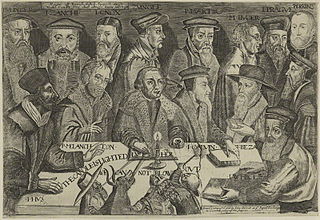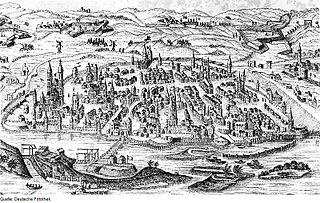
Calvinism, also called Reformed Christianity, is a major branch of Protestantism that follows the theological tradition and forms of Christian practice set down by John Calvin and various other Reformation-era theologians. It emphasizes the sovereignty of God and the authority of the Bible.

In European Christianity, the divine right of kings, divine right, or God's mandation, is a political and religious doctrine of political legitimacy of a monarchy. It is also known as the divine-right theory of kingship.

Theodore Beza was a French Calvinist Protestant theologian, reformer and scholar who played an important role in the Protestant Reformation. He was a disciple of John Calvin and lived most of his life in Geneva. Beza succeeded Calvin as the spiritual leader of the Republic of Geneva.
Justificatio sola fide, meaning justification by faith alone, is a soteriological doctrine in Christian theology commonly held to distinguish the Lutheran and Reformed traditions of Protestantism, among others, from the Catholic, Eastern Orthodox, Oriental Orthodox, Assyrian and Anabaptist churches. The doctrine asserts that it is on the basis of faith that believers are made right of their transgressions of divine law rather than on the basis of what Paul the Apostle calls "works of the law", sometimes called good works. This forgiveness is known as "justification". In classical Lutheran and Reformed theologies, works are seen as crucial evidence of faith, but the works themselves do not determine salvation. In contrast, Methodist doctrine affirms a belief in justification by faith that offers God's forgiveness, but holds that holy living with the goal of Christian perfection (sanctification) is essential for salvation. Anabaptist theology categorically rejects the Lutheran and Reformed doctrine of sola fide, and instead emphasizes a "faith that works"; Anabaptists teach that "justification begun a dynamic process by which the believer partook of the nature of Christ and was so enabled to live increasingly like Jesus."

Total depravity is a Protestant theological doctrine derived from the concept of original sin. It teaches that, as a consequence of man's fall, every person born into the world is enslaved to the service of sin as a result of their fallen nature and, apart from the efficacious (irresistible) or prevenient (enabling) grace of God, is completely unable to choose by themselves to follow God, refrain from evil, or accept the gift of salvation as it is offered.

In Christian theology, justification is the event or process by which sinners are made or declared to be righteous in the sight of God.

The Schmalkaldic War was the short period of violence from 1546 until 1547 between the forces of Emperor Charles V of the Holy Roman Empire, commanded by the Duke of Alba and the Duke of Saxony, and the Lutheran Schmalkaldic League within the domains of the Holy Roman Empire.
The Monarchomachs were originally French Huguenot theorists who opposed monarchy at the end of the 16th century, known in particular for having theoretically justified tyrannicide. The term was originally a pejorative word coined in 1600 by the Scottish royalist and Catholic William Barclay (1548–1608) from the Greek μόναρχος and μάχομαι, meaning "those who fight against monarchs" or "anti-monarchists".

Irresistible grace is a doctrine in Christian theology particularly associated with Calvinism, which teaches that the saving grace of God is effectually applied to those whom he has determined to save and, in God's timing, overcomes their resistance to obeying the call of the gospel, bringing them to faith in Christ. It is to be distinguished from prevenient grace, particularly associated with Arminianism, which teaches that the offer of salvation through grace does not act irresistibly in a purely cause-effect, deterministic method, but rather in an influence-and-response fashion that can be both freely accepted and freely denied.
The two kingdoms doctrine is a Protestant Christian doctrine that teaches that God is the ruler of the whole world and that he rules in two ways. The doctrine is held by Lutherans and represents the view of some Calvinists. John Calvin significantly modified Martin Luther's original two kingdoms doctrine and certain neo-Calvinists have adopted a different view known as transformationalism.
In political philosophy, the right of revolution is the right or duty of a people to "alter or abolish" a government that acts against their common interests or threatens the safety of the people without justifiable cause. Stated throughout history in one form or another, the belief in this right has been used to justify various revolutions, including the American Revolution, French Revolution, the Russian Revolution, and the Iranian Revolution.
Lutheranism as a religious movement originated in the early 16th century Holy Roman Empire as an attempt to reform the Roman Catholic Church. The movement originated with the call for a public debate regarding several issues within the Catholic Church by Martin Luther, then a professor of Bible at the young University of Wittenberg. Lutheranism soon became a wider religious and political movement within the Holy Roman Empire owing to support from key electors and the widespread adoption of the printing press. This movement soon spread throughout northern Europe and became the driving force behind the wider Protestant Reformation. Today, Lutheranism has spread from Europe to all six populated continents.

The theology of Martin Luther was instrumental in influencing the Protestant Reformation, specifically topics dealing with justification by faith, the relationship between the Law and Gospel, and various other theological ideas. Although Luther never wrote a systematic theology or a "summa" in the style of St. Thomas Aquinas, many of his ideas were systematized in the Lutheran Confessions.

Calvinism originated with the Reformation in Switzerland when Huldrych Zwingli began preaching what would become the first form of the Reformed doctrine in Zürich in 1519.

A Beerwolf is a German folk-tale monster commonly known as a werewolf.
Lutheranism is a major branch of Protestantism, identifying primarily with the theology of Martin Luther, the 16th-century German monk and reformer whose efforts to reform the theology and practices of the Catholic Church launched the Protestant Reformation.
The term Protestant ecclesiology refers to the spectrum of teachings held by the Protestant Reformers concerning the nature and mystery of the invisible church that is known in Protestantism as the Christian Church.

The discipline and administration of the Latin Church underwent important changes from 1517 to 1585 during and Counter-Reformation, specifically at the Council of Trent.
Resistance theory is an aspect of political thought, discussing the basis on which constituted authority may be resisted, by individuals or groups. In the European context it came to prominence as a consequence of the religious divisions in the early modern period that followed the Protestant Reformation. Resistance theories could justify disobedience on religious grounds to monarchs, and were significant in European national politics and international relations in the century leading up to the Peace of Westphalia of 1648. They can also underpin and justify the concept of revolution as now understood. The resistance theory of the early modern period can be considered to predate the formulations of natural and legal rights of citizens, and to co-exist with considerations of natural law.

The Magdeburg Confession was a Lutheran statement of faith. It was written by nine pastors of the city of Magdeburg in 1550 in response to the Augsburg Interim and the imposition of Roman Catholicism. The Confession explains why the leaders of the city refused to obey the imperial law, and were prepared to resist its implementation with force if necessary. The Magdeburg Confession calls for resistance to political tyranny, and argues that the "subordinate powers" in a state, faced with the situation where the "supreme power" is working to destroy true religion, may go further than non-cooperation with the supreme power and assist the faithful to resist.











